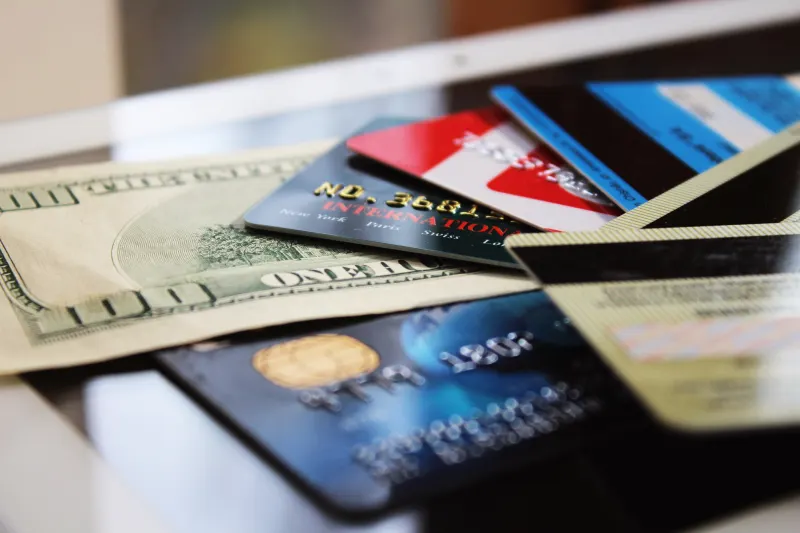Searching for “how do credit card companies make money.” Look no further! Credit card companies generate revenue by collecting interest and fees from their customers. Interest charges are levied on unpaid balances, while fees can be imposed for various services such as late payments, foreign transactions, or annual membership charges.
Credit card companies use these revenue streams to cover costs, provide rewards programs to customers, and generate profits for their shareholders. In this article, we will discuss how do credit card companies make money by charging various fees and interest rates.
Table of Contents
Annual fees
Do you ever wonder who’s behind the scenes of your credit card? They’re providing you with convenience and access to great deals – but it comes at a cost. Annual fees are one way credit card companies profit from their customers; you may not notice it on your monthly bill. We’re talking anything from fifteen bucks to five hundred or more. But don’t worry; it doesn’t seem so bad when you understand how these fees work for you. Look closely at the terms and conditions for your credit card, and you’ll be surprised at what benefits and savings these fees can bring.

Interest charges
Credit cards are the way to do it! With low interest rates ranging from 9-30%, you can access the funds you need for anything life throws your way. It’s not just about buying things you want– its about planning for the future. Ready to get started? Get your credit score in check, and hit that cash advance, balance transfer, or purchase button! Now that you have a credit card, unleash your inner financial genius and start taking control of your expenses. Don’t miss out on this incredible opportunity – start using credits cards and make the most of your funds today!
Late payment fees
Missed a payment? Don’t worry; everyone has their off days! But don’t forget, if you don’t pay your outstanding balance by the due date or are rejected for any other reason, you could be charged a hefty one-time fee. We’re talking up to $40 or more – ouch! Plus, the card issuer may apply an additional penalty interest rate which isn’t great news. So, if you want to stay on top of payments in the future and avoid extra fees, keep up with your payments on time!
Cash advance fees
Don’t let cash advances sneak up on you! When you withdraw money from your credit card, fees and interest charges come with it. Not only will the bank charge a fee (ranging from 2-5%) but they may also tack on an extra $5-$10 (or more). What’s worse is that these fees start accruing interest right away so make sure to pay off your cash advances as soon as possible to keep them from mounting up. Avoid any nasty surprises and stay ahead of cash advances – make sure to pay them off quickly!
Balance transfer fees
This is how do credit card companies make money. Don’t just give up and close your account – consider balance transfer fee instead! This fee is typically a percentage of the transferred balance, ranging from 2% to 5%. This convenient option lets you keep your accounts open and pay off your balances over time. That way, you can confidently face the future free from heavy debt.
Foreign transaction fees
With just one credit card, you can have access to the world! But be aware—many credit card companies may charge you a foreign transaction fee. From a 3% fee on any purchase price to covering exchange rate differences, this fee helps the credit card company cover its costs. However, don’t let that stop you from experiencing all the world’s wonders—just be mindful about this potential extra cost as you plan your adventure.
Overlimit fees
Exceed the predetermined limit on your credit card account? Not so fast! When a credit card user exceeds their limit, they can be charged an overlimit fee as a costly form of “punishment” by their credit card issuer. These fees, which can range from $25 to a whopping $39, are compensation for the risk you take when you exceed your limit. On top of that, you may also be charged interest on the amount beyond your set limit.
But don’t worry — there are ways to prevent these fees in the first place. Some credit card issuers do not allow customers to exceed their limits or have certain policies to assist. To make sure you’re not slapped with one of these astronomical charges, be sure to read through your credit card agreement carefully and gain an understanding of all terms relating to overlimit fees. Don’t get caught off-guard – prepare in advance with knowledge!
Return payment fees
Did you know a tiny $25 fee could help protect your financial well-being? Return fees, sometimes called insufficient funds, are charged when payments made towards a balance are returned due to incorrect information or lack of available funds. These fees may seem steep at first glance. Still, they protect the customer and credit card company from potential losses associated with late or faulty payments. So, don’t let this small fee deter you – it’s there to ensure you have a seamless, secure and reliable experience.

Rewards program fees
Credit card companies charge customers with rewards program fees to cover the costs of offering rewards such as cash back, airline miles, and points that can be redeemed for merchandise and experiences. These fees are typically absorbed by the merchant’s processing fee and passed on to the customer as a higher price or an annual fee charged by the credit card company. Rewards programs are designed to encourage customers to use their credit card more frequently and spend more money, ultimately leading to increased profits for the credit card companies.
Merchant fees
Shopping with your favorite credit card can be a great way to get rewards and incentives. But did you know merchants must pay fees every time customers purchase goods or services with their credit cards? These interchange fees usually cost between 1-4% of the total transaction – and if a business has high levels of credit card use, they can add up quickly!
That’s why all major credit card companies charge an interchange fee and additional service fee; this covers the costs of fraud protection, specialized customer support, analytics and more – all to ensure cardholders get the best experience possible. So next time you swipe your plastic, remember – there’s much more at play than meets the eye!
Final words
Swipe, smile and save – with a credit card; it’s all possible! Whether you’re getting cash back, shopping for rewards or simply tracking expenses, there’s an option for everyone. But have you ever thought about how do credit card companies make money?
It’s pretty straightforward: late payments come with hefty fees, annual memberships come with small costs that add up quickly, balance transfers require extra fees on top of the already low rates, over-the-limit charges can leave you in debt quickly, and foreign purchases call for even more careful accounting. On top of all this, credit card companies also get a percentage of every purchase you make with their cards. That’s right; they’re cashing in on your everyday shopping habits!
So remember: when using a credit card, it’s always important to consider the bigger picture. Don’t let yourself blindsided by hidden fees – know what you’re signing up for before swiping! We hope to have answered your question how do credit card companies make money.












